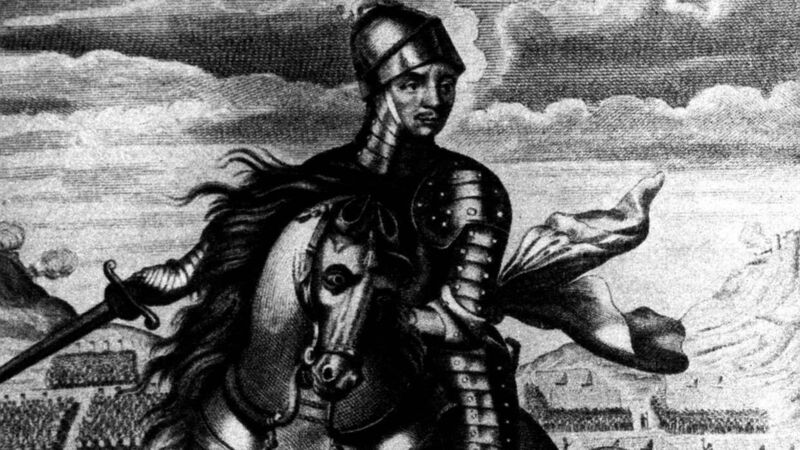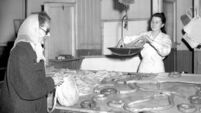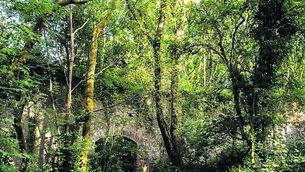John Arnold: 'We can’t deny Holocaust, nor can we deny Cromwell’s evil'

It was a fine day in September 1986, that I visited that awful place; 38 years later I can still visualise the spot, and last Monday, the 80th anniversary of the liberation of Auschwitz, was a stark reminder of that shocking and murderous era in global history.
Over a million people died or were killed in Auschwitz/Birkenau under the Nazi regime. In comparison - but comparisons in relation to deaths are probably futile - just over 41,000 lost their lives at Dachau and its surrounding sub-camps; there were over 100 of these ‘smaller’ camps.
All these unspeakable atrocities where people were tortured, mutilated, experimented with, sent to gas chambers (showers), and murdered in many more unspeakable ways. Imagine there are people in this world today - thousands of them - who would have us believe all this atrocity never happened. That it was all fake news, propaganda from the Allies, and a figment of the imagination of survivors in the 1950s.
Delusional advocates of ‘Holocaust Denial’ would have us believe that what happened in the concentration camps, salt mines, and slave labour ‘summer’ camps was all a lie, a fabrication, or a gross exaggeration of the truth.
Hatred is a terrible thing, and when it’s directed against a race or people of a certain religion, it’s even worse.
Ironic, then, wasn’t it, that on the very day world leaders and camp survivors gathered in remembrance at Auschwitz, the newly-elected US President should callously say in relation to Gaza, “Clear it out” - surely a case of 2025-style ethnic cleansing.
Last Monday’s ceremony at Auschwitz was poignant, with the four dozen or so survivors that made it back to the scene of their terrible incarceration eight decades ago. All now in their nineties, they bore testament to man’s inhumanity to man and no living person should dare deny their story.
With artificial intelligence now all the go and set to change the world as we know it, the stories of those very old people are more important than ever. The truth cannot be denied and their very presence on Monday was a living reminder of the deaths of a million of their comrades all those years ago. How many will be there in 2035 for the 90th anniversary?
Back in 1986, I was lucky to be part of a Macra na Feirme All-Ireland winners group who got a whistle-stop tour of Europe as our reward for winning a National Title - Bartlemy were the winners of the Panel Discussion.
That September, Munich was on our itinerary. We visited the Olymiastadion - built for the 1972 summer Olympic Games - and had the option of a bus trip out to Dachau, just ten miles from Munich.
As one enters the gate of the concentration camp, the wrought iron sign declares “Arbeit macht frei” (Work makes one free). Nothing could be further from the truth, as sadly tens of thousands of inmates learned to their cost.
In 1960, the camp was demolished but two of the original barracks were rebuilt and can still be visited today.
They say because of the murders and unspeakable cruelty inflicted there, that no songbird has ever nested next or near the place.
From the time our bus stopped, it was just complete silence - not the relaxing and inspiring silence of Mount Melleray, but an eerie and chilling silence.
We were given a guided tour of the place, including visits to the gas-chambers - inmates were stripped naked and told they were going for a shower. In one corner can still be seen heaps of shoes, piled high against a wall; children’s, men’s and women’s shoes. Human hair shaven from the heads of those on their way to die was also to be seen - a chilling reminder of the ghastly happenings here.
As American army troops neared the Dachau sub-camp in the town of Landsberg on April 27, 1945, the German SS officer in charge ordered that 4,000 prisoners be murdered. The windows and doors of their huts were nailed shut. The buildings were then doused with petrol and set on fire. The prisoners who were naked or nearly so were burnt to death, while some managed to crawl out of the buildings before dying.
That morning, as Nazi troops withdrew from Landsberg, locals hung white sheets from their windows. Angry SS troops dragged German civilians from their homes and hanged them from trees. The smell of the place – well, when I think of Dachau or read about it, I still get that smell in my nostrils - a singeing, burning, smoky, sickening odour. They say it’s the very same in Auschwitz.
Dachau was finally liberated on April 29, 1945.
The claim is also made that Cromwell’s order sending the native Irish “to hell or to Connacht” was in fact trying to protect them! Apparently, Cromwell was a good weather forecaster and realised in the spring of 1650 that a huge storm was about to blow over Munster and Leinster, and he thought ’twould be safer for people to go over to the West for their own safety!
Talking of Cromwell, I nearly got implicated with him a few years back. He arrived in Ireland in 1649 with an army estimated at 12,000. His campaign of terror and brutal warfare continued until 1653, but Cromwell himself had gone back to England long before that.
His daughter Mary was married to Henry Ireton and Ireton took his father-in-law’s place in Command of the marauding army.
Ireton, aged just 38, succumbed to either a fever or possibly the bubonic plague. They pickled his body in a barrel of rum and returned him to London for burial.
Allegedly, after Ireton’s demise, a Captain John Arnold was one of those in a position of power as Cromwell’s forces continued its brutal campaign all over Ireland.
That was 1652, and just 70 years later a man of the same name - Captain John Arnold - was collector of Poll Tax for the English monarchy in the parish of Castlelyons.
Now, Castlelyons is the next parish to here, so my fear was that I was descended directly from this undesirable line of Arnolds!
I kept my head down for a few years and ‘forgot’ all about tracing ‘my roots’. As Eamonn Kelly might have said, ‘things rested so’ until two years ago, when we were getting our old family headstones in Rathcormac cemetery cleaned and re-lettered.
Lo and behold, didn’t we find an Arnold ancestor born in the year 1639 commemorated on one stone. Whew, what a relief - that proved we were here at least a decade before Cromwell arrived in this country.
Trying to convince me Cromwell was a really nice guy is akin to denying the truth about Auschwitz and Dachau.
Remember the truth - lest we forget.







 App?
App?




